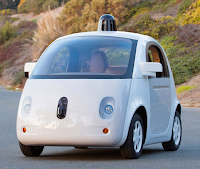Although Google’s autonomous car appears to be getting most
of the press, the auto-guidance system on tractors, combines, sprayers and
other farm equipment has been around for years. Farmers still “pilot” their equipment
today—sometimes pushing the “autopilot” button—but it does not take a crystal
ball to predict that someday farm machinery will pilot itself around fields
while farmers monitor such equipment remotely from a control room at the
farm. Are we ready for the liability
issues that may bring?
The technology already exists to make autonomous tractors a
reality. If you don’t believe me, check out this YouTube video of an autonomous John Deere tractor planting.
Likewise, Kinze Manufacturing has demoed an autonomous grain
cart that delivers grain from the combine to waiting trucks without a pilot on
board.
There are some obvious liability issues that come with
self-driving farm equipment. Accident
risks are huge. Google’s self-driving
cars are tiny and probably would “bounce” off another car in a collision. But a new four-wheel drive tractor that runs
out of control is not going to stop when it collides with vehicles, buildings,
etc. In automated farming, there are
concerns with people or objects being in fields where they normally would not
be, such as children playing in field while watching a tractor work, or cattle
getting loose in a hay field that is in the process of being cut. Would an
autonomous machine stop for an unforeseen obstacle?
 |
| Google's autonomous car |
The technology exists to minimize these risks, such as radar
sensors that would “see” a cow grazing in the wrong field and GPS that might
stop a tractor from leaving a field’s boundaries. For years cars have had accident avoidance
technology, such as pre-application of the breaks when a collision appears
eminent. Thus, for the most part,
autonomous farming could already be reality. And since most farm accidents are caused by
human error anyway, removing the human factor might actually decrease the risk
of an accident.
But we have not yet embraced autonomous farming. Why?
Autonomous farming potentially shifts the liability for farm
equipment accidents from the farmer to the equipment manufacturer. John Deere is not liable today when one of
its tractors runs into an intersection because its operator fell asleep. But if the same accident occurred because the
software malfunctioned and the machine failed to stop, liability would shift to
John Deere. Legislation could alter or
limit this liability, but I have not heard of any proposals to do so at this
time.
It is foreseeable that accidents will result in the blame-game
between equipment manufacturers and their customers. Manufacturers will blame the farmer for not
calibrating or setting up the equipment properly, and the farmer will blame the
manufacturer for a design flaw.
Equipment manufacturers don’t want or need this problem.
Another reason is emotional.
Americans are in a love affair with their food right now. Consumers crave a greater connection between
the dinner table and the farm. Taking the farmer out of the tractor seat
reinforces the wrong stereotype—that farmers are removed from and don’t care
about the land they tend.
Perhaps the question should not be when will we be ready for autonomous tractors, but when will Google build one?


No comments:
Post a Comment
Note: Only a member of this blog may post a comment.